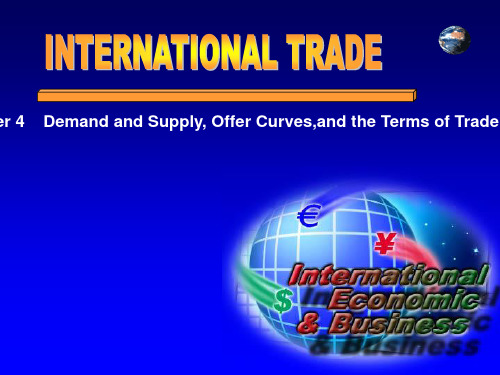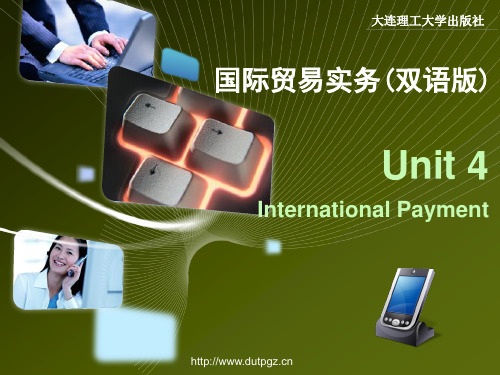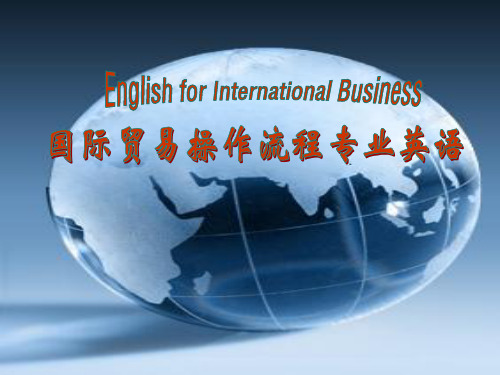国际贸易英语第四章讲义
- 格式:doc
- 大小:50.00 KB
- 文档页数:7






International Trade TheoriesChapter 4Arguments for Government Interventionin International TradeIn this chapter we’ll examine the reasons for government intervention in spite of the fact that some developed countries like the United States pay lip-service to free trade and talk a lot about the benefits of liberal trade.Arguments for government intervention in western trade experts’views, fall into two categories: political arguments, and economic arguments.Political ArgumentsFirst of all let’s examine the political arguments. This category of arguments cover a range of issues including; protecting jobs and industries, national security, retaliation, protecting consumers, furthering foreign policy objectives and protecting human rights.(1) Protecting jobs and industriesYes, export trade can create more job opportunities. But this is only one side of the coin. On the other hand, increasing imports can also make workers lose their jobs, The very recent US threat of using anti-dumping policy against Chinese exports of color TV sets and textiles to the U.S. is based on such grounds. To protect jobs and industries an importing country can take such measures as VERs and import quotas. VERs means voluntary export restraints, and is regarded as one of the most important of the non tariff trade barriers. From 1981 to 1985 the United States induced Japan to reduce its automobile exports to the US for the reason that growing Japanese auto exports had made the Big Three U.S. auto makers suffer a big loss of $4 billion and nearly 300,000 American auto workers lost their jobs.Similarly Japan’s quotas on rice imports from China and elsewhere are aimed at protecting jobs in that country’s agricultural sector, and the EU’s CAP was designed to protect the jobs of its politically powerful farmers by restricting imports, guaranteeing price, and granting subsidies in various forms.Of course, a price must be paid for taking such measures. Such protection costs consumers dearly and creates possibility of retaliation.(2) National securityWhy is the United States trying hard to protect its semi-conductor industry from foreigncompetition? The answer is simple: Because many American officials think semi-conductors are now such important components of their defense products that it would be dangerous to rely primarily on foreign producers for them. American restrictions of some high-tech exports are frequently justified on such grounds.(3) RetaliationRetaliation means “returning like for like, esp. returning evil for evil or paying back injury for injury.”Again we’ll take the United States as an example. Previous US governments have often adopted this get-tough approach by threatening to impose punitive trade sanctions to achieve its political purposes.However, retaliation is a highly risky strategy. If the threatened foreign government refuses to back down, say, by following a tit-for-tat policy, it will lead to a trade war or other conflicts. In the end both the threatening government and the threatened government will suffer a loss.Other countries’governments also, from time to time, use the threat to intervene in trade policy as a bargaining tool to help open foreign markets and force trading partners to play by the rules of the game for international trade.(4) Protecting consumersAfter the foot-mouth and mad cow diseases had been found and reported over the radio and in the press, countries, one after another, imposed bans on importation of beef from Europe. The purpose of doing so was to protect their consumers from the possible health consequences. By the same token, the EU baned importation of hormone-treated beef and discourage Europeans from buying GM food from the United States.(5) Furthering foreign policy objectivesVery often governments of various countries use trade to support their foreign policy objectives. The most obvious example in the end of 20th century was Iraq which had labored under the extreme trade sanctions after the UN coalition forces defeated the country in the 1991 Gulf War.Using trade as an instrument of foreign policy is not without defects. Other countries can take counter-measures to undermine any unilateral trade sanctions. For example, the U.S. sanctions against Cuba had not stopped other western countries from trading with that country.(6) Protecting human rightsDeveloped countries or the so-called western democracies, particularly the United States, every now and then, inflict punishments on countries with what they call human rights problems. Before China’s WTO entry there used to be an annual debate in the U.S. over whether or not togrant MEN treatment to China, in response to what it said human-rights violations.However, some trade experts are not wholly for limiting trade with countries having human rights problems. Some of them think that such a method makes matters worse, not better. To improve these countries’human rights picture it is better to engage them in international trade. What is more, developed countries including the United States also have their own human rights problems.Economic Arguments(1) Protecting infant industryAn infant industry is a new industry that may merit some protection against foreign competition in the short term.The argument in favor of providing protection, say, in the form of a tariff on imported competitors’goods, is that it would provide a period during which the new industry could streamline its process and make the necessary economies in order for it to become truly competitive with all market producers, especially those in the developed world.Such argument has appealed to the governments of developing nations during the past 40 years or so. In addition, the infant industry argument has been recognized as a legitimate reason for protectionism by the WTO.Nevertheless, many economists remain critical of this argument. They have made two main points in their criticism of this argument. First, protection from foreign competition does no good unless it helps make the infant industry efficient. Secondly, the infant industry argument often relies on an assumption that firms are unable to make efficient long-term investments by borrowing money from domestic or international markets. Consequently, governments have been required to subidize their long-term investments.(2) Strategic trade policies argument●DefinitionStrategic trade policies refer to those policies that promote exports or discourage imports in particular economic sectors.●The components to the strategic trade policies argumentThere are two components to this argument. First, a government can help raise national income if it can somehow ensure that the firms to be supported by subsidies which have the hope of gaining first-mover advantage in an industry are domestic rather than foreign enterprises; second, strategic trade policies can pay government to intervene in an industry if such policies help domestic firms overcome the barriers to entry erected by foreign firms that have alreadyreaped first-mover advantage.●Criteria of strategic trade policiesThree criteria have been especially popular among supporters of strategic trade policies. They are: (1) Industries are desirable if they have high value added per worker; (2) Industries are desirable if they pay high wages; and (3) Industries are desirable if they make use of high technology.●Case studies of strategic trade policiesA very frequently used example of strategic example is the Airbus case. Airbus is a consortium of European governments that produces large passenger airplanes, competing directly with US counterpart.Since 1970s, the U.K, France, Germany and Spain have used $ 13.5 billion subsidy to increase Airbus competitiveness. As a result it gained around 40% of the world’s commercial aircraft market, posing a threat to Boeing’s dominance by the late 1990s.After the mid-1970s, Japan’s strategic trade policy has been aimed at developing its knowledge-intensive or high-tech industries by granting subsidies. Consequently Japan has become a significant producer of some products in which recent strategic trade policy has played a key role. The most famous and most significant of these are semi-conductor chips, digital color TV sets and video movie cameras and other high-tech products.New Words1. to further 促进,推进2. retaliation 报复3. anti-dumping 反倾销(的)4. to induce 劝使5. to design 事先计划好,事先制定6. semi-conductor 半导体(的)7. high-tech 高技术(的)8. get-tough 强硬的9. punitive 惩罚性的10. sanction 制裁11. tit-for-tat 针锋相对12. conflict 冲突13. ban 禁令(当动词用时表示“禁止”)14. hormone-treated 经激素处理过的15. to labour 苦苦挣扎16. sanction 制裁17. instrument 工具(= tool)18. counter-measures 对策,反对手段19. to merit 应受20. picture 状况21. to streamline 使现代化,使合理化,精减使效率变高22. legitimate 合法化23. to subsidize 对……进行补贴24. strategic 战略上的,战略的25. desirable 值得想望的26. chip (s) 集成电路块,芯片27. digital 数字的28. critical 对……表示谴责的,对……表示不满的Useful Phrases and Idiomatic Expressions1. to fall into 分成,分为(to be divided into)2. a range of 一系列,一连串3. one side of coin 问题的一个侧面或方面4. to be based on such grounds 基于这些因素5. to cost sb. dearly 使某人付出高昂的代价6. to back down 让步,改变原来的态度或立场(to yield in argument, point of view, or claim,美国人常用“to back off”表示同样的意思)7. to impose bans on sth. 对….实行禁令8. every now and then 时而,不时9. to engage sb. in 使某人卷入或参与10. to appeal to (文中)对……有吸引力(有时也表示“向……上诉”)11. to be critical of sth. 对……表示不满,对……表示谴责12. to pose a threat to sb. 对某人形成威胁13. in the press 在报刊上14. to pay lip service to sth. 对……口头上说好听的话Supplementary Reading for Chapter 4U.S. Won’t Push Japan on Moves to Weaken the Yen,Snow SaysBy G. THOMAS SIMSFRANKFURT — In a slap to U.S. manufacturers, Treasury Secretary John Snow said Friday that the U.S. won’t press the Japanese to stop its efforts to weaken the yen—a tactic that gives that nation’s exporters a competitive advantage.The comments are likely to anger U.S. manufactures, which have been pressing the administration hard to stop the Japanese from intervening in foreign exchange markets to weaken the yen. They first pushed the Treasury Department to abandon the rhetoric of a strong dollar, which Mr. Snow has effectively done. Now they want the administration to strong-arm theJapanese and Chinese to let their currencies rise.“Interventions in our view shoul d be kept to a minimum, but at the same time, Japan is going through a tough set of things they are trying to deal with,” Mr. Snow told journalists in Frank fury. “As they deal with those things, we are not going to be critical of them at all for their act ions. They need a strong export sector to be able to finance their ability to get the reforms done and strengthen the domestic sector.”The Treasury Secretary continued to say that he hoped that Japan would eventually become less heavy-handed in markets on ce it gets over its problems. “I hope in longer term they too will move in the direction of a more freely fluctuating exchange rate, letting markets set value,” Mr. Snow said, “That’s the right long-term regime to move to, but there are often obstacles to getting to that.”The statements also fueled speculation that the Bank of Japan would become even more active in its dollar purchases since it received what seemed like a bit of a green light from Washington. On Friday, the dollar sank against the yen to a global session low at 118.25 yen before finding support and heading up toward 118.38 yen late in the day in New York, also well of its session high of 119.21 yen and down from 118.71 yen late Thursday.Mr. Snow was speaking with reporters after a four-day tour through Europe. He was meeting European finance ministers, central bankers and business leaders to urge them to pursue policies that promote growth.After the press conference, a Treasury spokesman played down the comments by suggesting that Mr. Snow might have talked to the Japanese in private. Tony Fratto, the spokesman, told reporters that Mr. Snow has said “many times that the best way to set relative currency values is in open competitive markets.”“Anything Secretary Snow has to say to the Japanese on currencies he will say directly,” Mr. Fratto said. Mr. Snow plans to travel to Japan later this year.Japan’s massive dollar purchases — it has spent roughly seven trillion yen ($59.1 billion) so far this year buying dollars for yen — helps the U.S. financial system given that Japan’s Ministry of Finance often puts the proceeds back into U.S. securities, in particular Treasury and agency debt. This helps support these markets and finance the U.S.’s growing current-account deficit —the broadest form of the trade balance.The fact that Mr. Snow spoke so frankly in public about Japan’s practices astounded many in the currency markets, particularly as the same official has publicly urged China to move down the road toward exchange-rate flexibility.“I wouldn’t imagine the administration wants to get into the game of condoning one country’s intervention and condemning another’s,” said Lara Rhame, senior economist at Brown Brothers Harriman in New York.The remarks once again underscore the difficulty the Bush administration has had more broadly with the strong-dollar policy it inherited from the Clinton years that it has never feltcomfortable with and has had difficulty articulating.A strong dollar and a weak yen make U.S. goods relatively more expensive in foreign markets, putting manufactures in the U.S. at a disadvantage.The Wall Street journal, July 1, 2003。